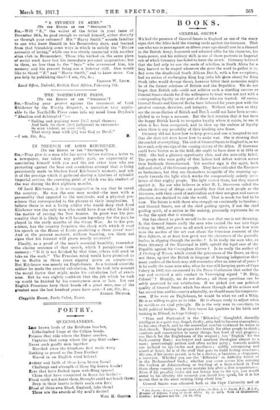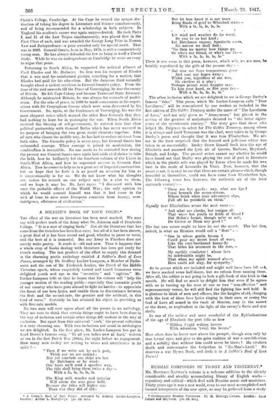BOOKS.
GENERAL SMUTS.* WE hail the presence of General Smuts in England as one of the many signs that the Allies hold the winning cards against the Germans. That one who was in arms against us fifteen years ago should now be a General in the British Army, honoured and admired alike for his character, his brain-power, and his military skill, is one of those portents in Imperial rule of which Germany has failed to learn the secret. Germany believed that sho had only to sow the seeds of rebellion in South Africa for a fiery harvest to be reaped whenever she gave the word to gather it in. But even the disaffected South African Dutch, with a few exceptions, had no notion of exchanging King Log (who left them alone) for King Stork (who would devour them), however bitter their memories might be of the former relations of Britain and the Republics. We do not forget that British rule could not achieve such a startling success as General Smuts stands for if the willingness to trust were not met with a corresponding loyalty on the part of those who are trusted. Of course, General Smuts and General Botha have behaved for years past with the greatest courage, devotion, and integrity. Without such men as they
are the reconciliation of British and Dutch could not Lavo been accom- plished in so large a measure. But the fact remains that it has been the happy British knack to recognize loyalty where it exists, to use it when it has been recognized, and to blow up the embers of loyalty when there is any possibility of their kindling into flame.
Germany did not know how to keep peace, and one is tempted to say that she does not even know how to make war. She is showing that she can fail at everything. The visit of General Smuts to England is, as wo have said, only one sign of the coming victory of the Allies. If Germany could have beaten us in the field, she ought to have done it in 1914 or 1915. She had a glorious opportunity then, and she miserably failed. The people who were guilty of that failure had defeat written across their foreheads thenceforward. Yet another sign is the spirit, both dull and cruel, of the German people. They have ridiculed tho Russians as barbarians, but they are themselves incapable of the straining up- wards towards the light which marks the comparatively orderly revo- lution of that mighty people. The light visited them, but they sinned against it. No one who believes in what R. L. Stevenson called the ultimate decency of things can possibly fear that such people as the Germans, with their creed of materialism and their arrogant and narrow practices, are destined to rule the world. That is much too bad to bo true. The future is with those who struggle on continually to freedom ; and General Smuts, ono of the chief guiding spirits, if not the chief guiding spirit, of a nation in the making, personally represents for us to-day the spirit that is winning.
One has almost to pinch oneself to be sure that one is not dreaming. Is this General Smuts really the man who carried the war into Cape Colony in 1902, and gave us all much anxiety when we saw how wide were the meshes of the net cast about the tenacious remnant of the Boer fighters, or at least how great was the cleverness of the guerrilla leaders in slipping through the meshes ? Is lie really the man who, as State Attorney of the Transvaal in 1899, upheld the legal case of the Republic against Sir C'onyngham Greene ? Is he really the author of A Century of ll're»e, which stated the grievances of tho Boers, as they saw them, against the British in language of burning indignation that many readers of the book may still remember after an interval of years ? Is he really the same man who, when he was still harrying parts of Care Colony in 1902, was summoned to the Peace Conference that ended the war and received a safe conduct to Vereeniging signed " D. Haig, Colonel" 1 Happily, we do not dream ; all these questions can to safely answered to our satisfaction. If we picked out one political quality of Genera! Smuts which has shone through all his actions and has served him and his country admirably, we should name his temperate. ness. If he were an Englishman, he would be what we call a Whig. He is as willing to give as to take. He is always ready to adjust when he sacrifices no vital principle. lie is the very man to conciliate, to build political bridges. Mr. Levi traces his qualities to his birth and training in Mend, in Cape Colony :- "Prim and Puritanical is the ' Mender,' thoughtful, shrewdly intelligent in a quiet way, frugal, thrifty, attached to his own atmosphere, to his own church, and to the somewhat sombre vestment he wears in that church. Turning his grapes into brandy for other people to drink ; cautious and conservative in many things, but fond of real progress ; too Dutch for the Englishman of the seaport ; too ' English' for the back-country Boer ; sea-lawyer and amateur theologian almost to a man ; perseveringly patient and often rather petty ; towards middle age inclined to spectacles and poilliness ; mildly enterprising and sound at heat', he is of the stuff that goes to build lasting structures. His son, if his means permit, is to be a doctor, a banister, a clergyman, a surveyor. Whether you see the B6lander ' in Adderley Street or in the Bechuanaland bush ; whether you come across him entering the Carlton at Johannesburg or teaching at a farm-school in Free State sheep country, you never mistake him after a first acquaintance. Even if his peculiar cachet did not betray him to the eye, you would swear to his identity the moment you heard him speak, for it is his accent that is the most striking thing about him."
General Smuts was educated both at the Cape University and at
• Jan SnIalt : blew a Character Sketch of Gen. thr Ron. J. C. Smuts, I f.0 , M.L.A., Miniuter of Defence, Orion of South Africa. By Lerl. With 12 Illuatratiou3. London: Longinana and Co. 17s. dd. net.'
Christ's College, Cambridge. At the Cape he earned the unique dis- tinction of taking his degree in Literature and Science simultaneously, and of being recommended for a scholarship in both subjects. In England his academic career was again unprecedented. He took Parts 1. and IL of the Law Tripes simultaneously, was placed first in the First Class of each, and was awarded the George Long Prize in Roman Law and Jurisprudence—a prize awarded only for special merit. That was in 1892. General Smuts, born in May, 1870, is still a comparatively young man. He has always defended the law as being in itself a liberal study. While he was an undergraduate at Cambridge he wrote an essay to argue that point.
Returning to South Africa, he supported the political alliance of Cecil Rhodes and Mr. Hofincyr. So firm was his support of Rhodes that it was said by. uninformed gossips, searching for a motive, that Rhodes had paid for his education. But the Jamezon Raid naturally brought about a violent revulsion in General Smuts's policy. From the time of the raid onwards till the Peace of Vereeniging, he was the enemy of Britain. He left Cape Colony and became Transvaal State Attorney. Although he mistrusted Britain, he was always for counsels of moder- ation. For the sake of peace, in 1899 he made concessions in his negoti- ations with Sir Conyngharn Greene which were soon disavowed by his Government. So, again, at the Conference of Vereeniging, his was the most eloquent voice which warned the other Boer Generals that they had nothing to hope for in prolonging the war. When South Africa received the blessing of self-government, he entered into that close political partnership with General Botha which has never wavered in its purpose of bringing the two great racial elements together. Like all men who choose the middle way, he has had to endure mistrust from both sides. The Girondin policy is never easy, but General Smuts has unbounded courage. When courage is joined to moderation, the combination is irresistible. No one needs to be reminded how during the present war General Smuts once again laid aside civil duties to take the field, how he brilliantly led the Southern column of the Union in South-West Africa, and how he organized success in German East Africa. Now ho comes to help us in a great act of Imperial construction. Let us hope that he feels it is as proud an occasion for him as it unquestionably is for us. We do not know what. his thoughts are, unless his remark on one subject may be a clue to them, and we hope it may be. Mr. Levi says : " I discussed with him once the probable effects of the World War; the only opinion to which ho would commit himself was that it had come in the nick of time to save some European countries from luxury, over- indulgence, effeteness of civilization."



























 Previous page
Previous page